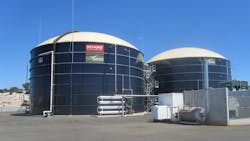Richgro Opens New AD Plant in Australia
Richgro opened a new AD plant in Western Australia. The company partnered with Anaerobic Digestion and Bioresources Assn. (ADBA) members Landia, Biodome Asia, Edina and Uniflare to design and develop a plant with energy-efficient features.
Richgro sought to form a closed loop with potential to utilize heat and carbon dioxide produced on site. The company pursued blending digestate with existing Richgro product to improve nutritional and breakdown characteristics and market the new by-product as a bio-fertilizer.
“We believed in using food waste and not growing crops to be used as fuel,” said Richgro Managing Director Geoff Richards. “For me, it is very important that we find as many natural solutions as possible to the problems that confront the world—and the production of food is one of the biggest. I also wanted to steer well clear of a boxed solution, because I needed to know what would be going on inside our AD plant, understand it and be able to operate it in our part of the world.”
Biogass Renewables assisted Richgro in gaining approval for the AD plant from Western Australia’s Department of Environment Regulation. Biogass Renewables then helped secure £1.1 million for the project under a debt-funding arrangement from the Clean Energy Finance Corp., as well as an additional £800,000 in grants from the Australian Government’s Clean Technology Investment program and the Western Australia State Government. Payback (before grants) on capital is expected within four years.
Landia, Biodome Asia, Edina and Uniflare worked closely to coordinate delivery and installation for Biogass Renewables. First, the partners overcame a low voltage grid connection. A major upgrade to high voltage was required so that Richgro could import sufficient energy, as well as export up to 2 MW of power.
Operational since January, Richgro now generates income from the gate fee for diverting waste from the landfill, as well as from the digestate as a biofertiliser by-product.
Approximately 100 tons of food and liquid waste (approximately 35% dry solids) is delivered to the Jandakot, Western Australia, plant each day from supermarkets, abattoirs, fast food chains, breweries and soft drink manufacturers. The facility has a de-packaging system to remove contaminants in order to enhance the digestion process with a pumpable feedstock. Where possible, leftover packaging is sent for recycling.
The feedstock is then added to a blending tank to ensure that the pH balance, proteins, fats and other organics are in a good ratio to aid digestion, which is checked by the on-site laboratory before being placed into a buffer tank. The buffer tank acts as a store for the organic matter for the intermittent feeding of the digesters throughout the day.
This organic matter is then fed into two, 2,500 cu meter capacity, glass-fused-to-steel digesters, which have Biodome double membrane gasholders on the top. In addition, Biodome Asia supplied the 350 m³ open-topped blending tank, a 350 m³ feeding tank with steel roof and a 500 m³ digestate storage tank with steel roof.
The feedstock that has passed into the primary digester has its own external heating system to maintain the temperature of the digesters, which utilizes the co-generated surplus heat from the Edina gas engine to maintain a temperature of approximately 36 degrees Celsius.
Digester mixing uses Landia’s externally mounted GasMix system, which Richgro uses for its ease of service, enhanced gas yields and reduction in volatile solids. For pre-treatment, GasMix also reduces viscosity by 30% and is energy efficient, usually only needing to run for seven to 10 minutes in the hour, so the consumed power is one-sixth of the installed power.
The gas is then cleaned using a Uniflare flare stack before being turned into energy by an Edina CHP engine. Electricity is consumed on site and exported to the grid. The heat is used in new, on-site greenhouses for growing blueberries (a new revenue stream for Richgro) and for maintaining the plant’s temperature. Water and digestate are used within the composting facility, which saves funds and reduces the carbon footprint of Richgro.
Edina supplied Richgro with the MWM TCG 2020 V12 1.2 MWe biogas CHP engine, which was containerized at the company’s manufacturing facility in Lisburn, Northern Ireland, before being transported directly to site. Edina commissioned and currently maintains the biogas CHP over a long-term service, operation and maintenance package. Following the success of the installation and performance of the MWM biogas CHP, Richgro have since placed an additional order for a second MWM TCG 2020 V12 biogas CHP engine, which is due to be commissioned in December 2016.
Biogas is captured from the digester and chilled to its dew point to remove moisture before boosting to a containerized Edina co-generator, which produces heat and power through a reciprocating high-efficiency engine.
Energy is now harnessed by Richgro’s operations to power all of the site’s equipment, with the surplus exported to the Western Australian electricity grid. Over a 20-year lifespan, the plant is expected to save 142,722 tons of carbon dioxide emissions and eliminate electricity costs.
Less than two months since commissioning, the Richgro facility’s processing of mixed commercial and industrial food waste gave a biogas yield of 138 m3/ton. The process capture efficiency was recorded at 91%, with 1 ton of food waste generating 415 kWe and 435 kWth from the single onsite CHP, which is running at 100%, producing up to 1.2 MW.
Source: Landia
